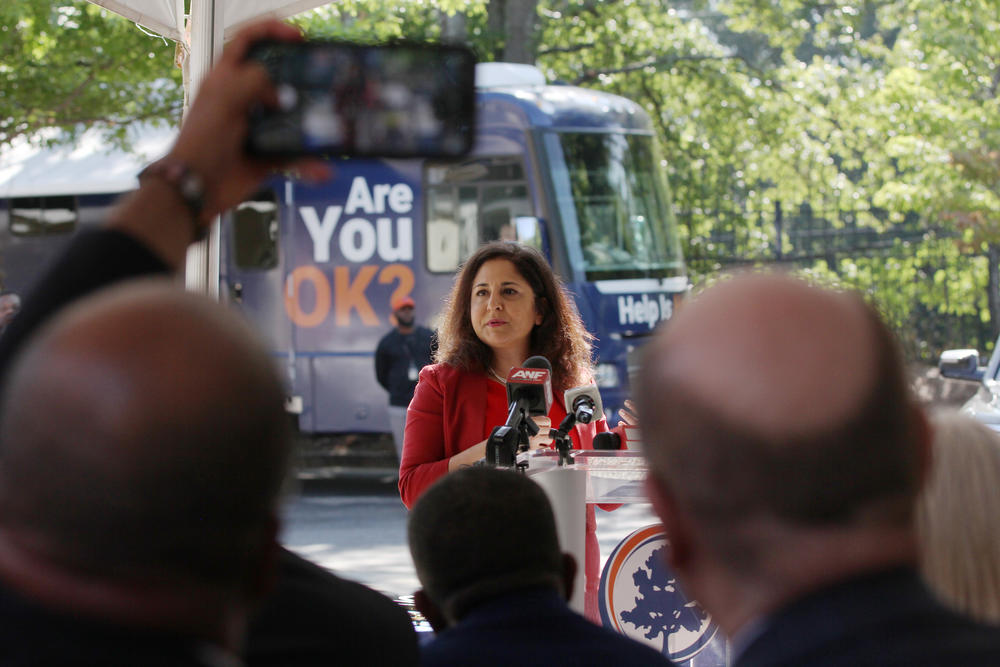
Caption
Weighted chairs sit empty on an outdoor porch at the new Behavioral Health Crisis Center.
Credit: Sofi Gratas/GPB News
Located in the same building where families in South Fulton receive hearing exams, child medical care and some social services, the new Fulton County Behavioral Health Crisis Center aims to help people experiencing mental health crises.
The Oak Hill Child and Adolescent Center will continue to offer its regular services. The new crisis center is one of three recommended to meet the area’s mental health needs.

Weighted chairs sit empty on an outdoor porch at the new Behavioral Health Crisis Center.
Already, the state is considered building a second crisis center in North Fulton though no funding has been officially allocated yet.
City stakeholders, including a White House official, gathered for an official ribbon-cutting on the center Thursday morning.
“Ultimately, it will save lives, and that's what it's all about,” Atlanta Mayor Andre Dickens said at the ceremony.
Inside the crisis center are 24 inpatient beds, 16 observation chairs and private rooms for peer support. Interior design focussed on elements that keep people from harming themselves, like soft edges and weighted furniture.
The plan is to offer a spectrum of mental and behavioral health help every day of the week at all hours. That help could include admission or referrals to other services. The center is open for walk-ins and will also deploy a mobile unit with a trained crisis response team when needed.
Neera Tanden, policy advisor to President Joe Biden, joined local leaders to celebrate the new center. Tanden previously worked under the Obama administration on health reform.

White House Policy Advisor, Neera Tanden, called the new crisis center in Fulton County a "role model facility for the nation."
“We will take this, your example, to the Congress and others about why we need additional support to actually tackle this challenge in every corner of the country,” Tanden said.
The center was funded with $15 million in American Rescue Plan Act dollars allocated by city leaders in 2021. Georgia is expected to receive just over $17 billion in ARPA funds.
Almost $1 billion has been set aside in block grants to address mental health and substance abuse, while other funding for things like public safety have gone toward building crisis response teams in some rural counties.
Data on calls to the national suicide and crisis hotline, 988, launched two years ago, shows a growing need for support. Calls, texts and chats to the hotline are up 80% from when it launched, according to a recent analysis.
Meanwhile in Georgia, weekly calls to the national and state hotline are lower than the past couple of years, though the number of mobile crisis dispatches and referrals to services given to people calling have stayed pretty similar.
Most calls are still coming out of Middle and South Georgia, regions with historically less access to mental health resources.
Local leaders say on the ground, they expect plenty of people to take advantage of the services offered at the new crisis center.
Fulton County Chairman Robb Pitts said in opening the center, the city aims to fill gaps left behind by the closure of Wellstar Atlanta Medical Center and Wellstar Atlanta Medical Center South in 2022.
“Let us not forget how severely the closures of the two Wellstar hospitals affected health care in this community,” Pitts said.
Often, emergency rooms become a holding place for people experiencing mental or behavioral health issues who have nowhere else to go.
Late last year Grady Memorial Hospital opened a new med-psych unit in partnership with the Department of Behavioral Health and Developmental Disabilities to help ease that burden off its own facilities.
Now over 100 medical workers from Grady will be on staff at the South Fulton center including pharmacists, counselors and clinicians.
“We’ve long known the need for a standalone crisis center in Fulton County,” said Shannon Sale of Grady Health Systems. “The center will fill a critical void in behavioral health emergency services close to home.”